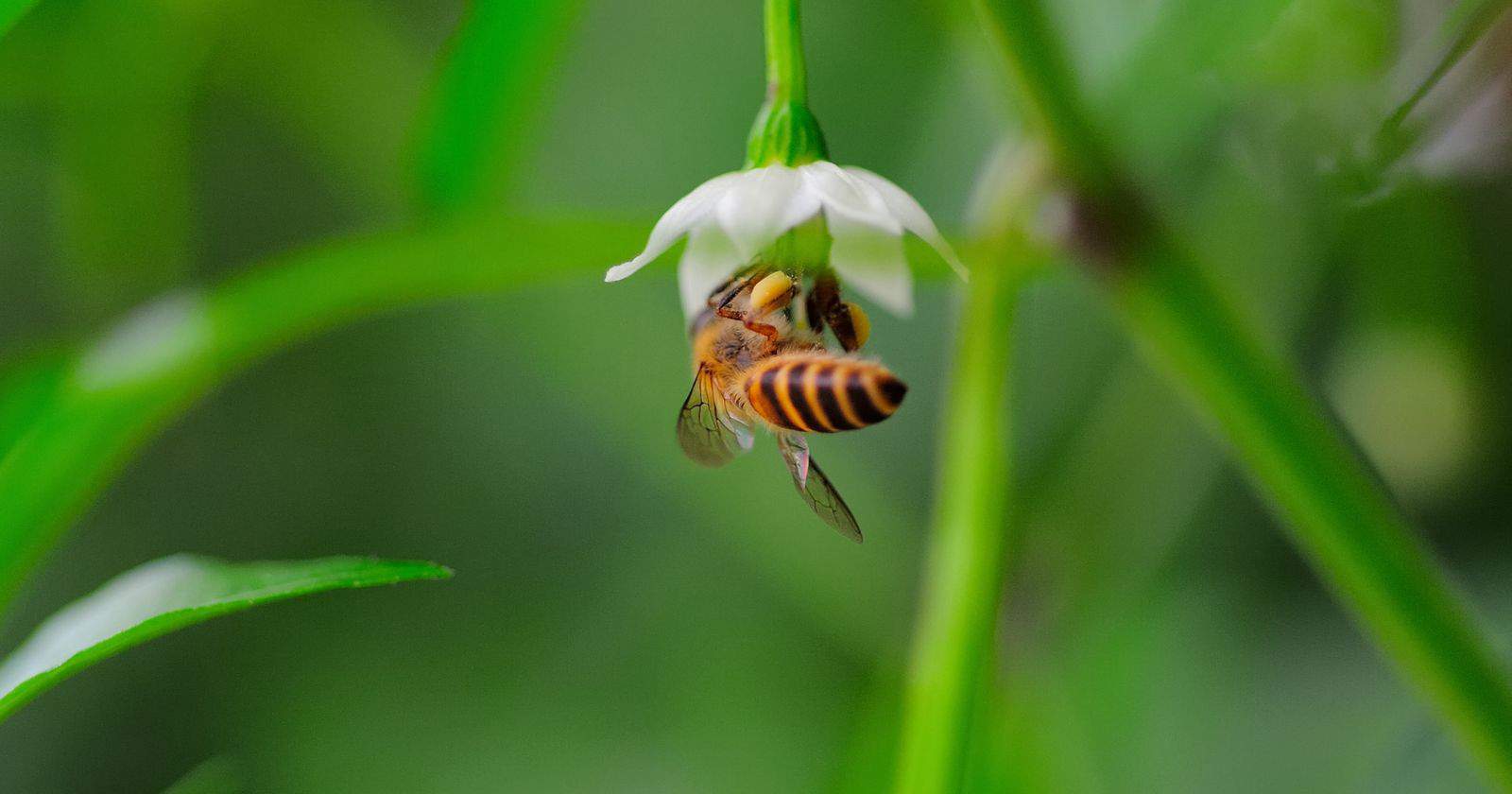Cayenne pepper may seem like an ideal natural deterrent to keep buzzing bees away from your garden. However, is this spicy repellent truly bee-friendly?
The simple answer is no. While cayenne pepper can irritate and repel bees, it also poses risks of harming our precious pollinator friends. The compound capsaicin found in cayenne and other hot peppers can be toxic to insects like bees. Direct contact with cayenne can burn bees’ delicate skin and eyes. Even bee hives sprinkled with ground cayenne pepper may suffer detrimental effects.
There are several clear drawbacks to using cayenne pepper around our busy bee buddies:
- Cayenne toxicity endangers bees and other beneficial insects
- Bee irritation from direct contact with cayenne pepper sprays
- Repellent effects that deter bees from pollinating gardens
Luckily, gardeners don’t have to resort to cayenne pepper to control pesky bees. There are many plant-based solutions that naturally repel bees without harming them. And learning bee-conscious pest control provides effective alternatives to safely manage garden invaders while protecting our pollinators.
This article will explore cayenne pepper’s impacts on bees and offer eco-friendly solutions to gently keep bees away from certain areas. Let’s dive in and “bee-friend” our gardens!
Cayenne Pepper’s Effects on Bees
Cayenne pepper contains a compound called capsaicin which gives the pepper its spicy heat and pungent smell. There are some definite concerns around the use of cayenne pepper when bees are present:
Can Cayenne Pepper Hurt Bees?
- The toxicity of capsaicin has been reported to impact small beneficial insects like bees. It is unclear whether cayenne can directly kill bees, but it does pose a potential risk.
- Ground cayenne pepper sprinkled around bee hives or nests may potentially harm them according to some sources. Direct contact seems to be the biggest concern.
- Cayenne pepper sprayed directly on bees can irritate their skin and eyes just as it does in mammals. This causes discomfort and distress.
Does Cayenne Pepper Deter Bees?
- Cayenne pepper is known to repel some insect pests through irritation and taste deterrence. It seems bees may also avoid areas where cayenne pepper has been applied.
- The strong scent of cayenne pepper may interfere with bees’ sensitive sense of smell which they rely on for navigation. This can deter bees from foraging in areas where cayenne is present.
- A mixture of cayenne pepper and citrus oil has been found to repel ants without harming bees. The citrus oil likely neutralizes the irritating effects of the cayenne.
Exercise Caution When Using Cayenne Pepper Around Bees
It is clear that cayenne pepper does have the potential to harm or deter bees through irritation and toxicity. For this reason, caution should be exercised when using cayenne pepper in any area frequented by bees. Here are some tips:
Avoid Direct Contact
- Do not spray cayenne pepper solution directly onto beehives or areas where bees are actively foraging. This direct contact can irritate skin and eyes.
- Sprinkle ground cayenne pepper sparingly and only in areas away from hives or nests. Never sprinkle cayenne powder in or around the home of bee colonies.
Monitor Bee Activity
- Keep an eye out for signs of irritation or avoidance behavior in bees after applying cayenne pepper in an area. Discontinue use if any concerning reactions are noticed.
Apply Strategically
- Apply cayenne pepper repellent solutions at night when bees are least active to allow time for the solution to dry before bees are active again. This prevents wet spray from clinging to bees’ bodies.
- Target application to localized areas away from flowers and avoid widespread spraying in the garden where bees may accidentally encounter residue.
Natural Bee Repellents
Thankfully, there are many organic and bee-safe solutions to repel bees from specific areas. Here are some effective natural bee repellents to use instead of cayenne pepper:
Peppermint Oil
The strong menthol scent of peppermint oil is offensive to bees but harmless. Use pure peppermint essential oil diluted in water and sprayed around areas you want to deter bees from. Planting peppermint in your garden can also discourage bees from frequenting those areas.
Citronella
Widely used in insect repellent candles and sprays, the citronella plant has an aroma that bees strongly dislike. The oil can be harvested from the plant and used to repel bees as well. Grow citronella in pots or garden beds to keep bees away naturally.
Coffee Grounds
Used coffee grounds sprinkled onto soil creates an odor that bees and other insects avoid. The grounds also add organic material to enrich the soil. Just a thin layer applied daily can keep bees from congregating in garden beds.
Vinegar
Normal household white vinegar has a sour smell that bees strongly avoid. A 50/50 mixture of vinegar and water in a spray bottle can be used to safely repel bees from patios, decks, or outdoor tables. Reapply after rain.
Cucumber Peels
Fresh cucumber peels contain an enzyme called cucurbitacin that gives off an aroma repulsive to bees. Place fresh peels on a plate, and replace daily. The peels will repel bees without any harm.
Will Cayenne Pepper Hurt Flowers?
In addition to potentially harming bees, there is also a risk that cayenne pepper could damage ornamental flowers and edible crops. The spicy capsaicin compound in cayenne pepper can negatively impact certain plants.
Impacts on Ornamental Flowers
Many flowering plants with thin, delicate petals and pistils could be damaged by exposure to cayenne pepper sprays or dusts. The irritation caused by capsaicin may lead to burnt or dried out flower petals and reproductive parts. This can reduce blooms and seed production.
Flowers in the daisy, orchid, rose, and lily families tend to be most vulnerable to pepper sprays. Cayenne residue on leaves can also create unsightly blemishes. It is best to keep cayenne far away from prized ornamental flowers.
Risks to Edible Crops
Cayenne pepper solutions sprayed directly onto vegetable plants or fruit trees may diminish yields. Cayenne could stunt growth by burning tender young shoots. It can also cause fruit and vegetable flowers to shrivel and fall off, reducing pollination.
The most significant risk is that capsaicin residue left on edible produce could make it too spicy to consume. Always harvest crops before applying cayenne pepper in a garden to prevent contamination.
How Do I Get Rid of Ants Without Harming Bees?
Ants can become a nuisance in gardens, invading homes and cropping up in flower beds. But many common ant deterrents like cayenne pepper can also pose risks to our helpful pollinating bees. Here are some effective approaches to get rid of ants without causing any harm to bees:
- Use cornmeal sprinkled around ant nests or entry points. The ants eat the cornmeal which swells up inside them.
- Mix equal parts borax and sugar for homemade ant bait. The borax is toxic to ants but harmless to bees. Place it in sealed containers with holes poked in the top near ant trails.
- Pour boiling water directly down ant mounds to instantly kill colonies while leaving surrounding areas unchanged for bees.
- Draw a chalk line barrier around areas you want to protect from ants. The calcium carbonate disrupts ant scents trails so they can’t cross.
- Wipe counter tops and windowsills with diluted vinegar to repel ant trails. The vinegar evaporates quickly leaving no residue that could impact bees.
- Sprinkle diatomaceous earth around ant nests and entry points to shred and dehydrate the ants’ exoskeletons. DE has no effects on flying bees.
- Set out overripe fruit, bread, or meat scraps on a raised platform with soapy water underneath. It lures ants which then drown once they fall into the soapy water.
- Invite natural ant predators like spiders, ladybugs, lacewings, and birds into your garden by providing habitat for them.
Can You Spray Pepper Spray at Bees?
Pepper spray contains highly concentrated capsaicin just like cayenne pepper. It is sometimes perceived as a quick homemade remedy to repel bees from an area. However, there are very good reasons why you should never spray pepper spray directly at bees.
- It can be fatal – The high potency formula of pepper sprays is designed to deter bears and humans. When sprayed right onto bees, it can deliver a lethal dose.
- Harm to hives – Pepper spray can penetrate bee hives from the outside, contaminating them with capsaicin. This can poison larva and pupae inside, wiping out whole generations.
- Loss of bees – Overuse of pepper spray could damage local bee populations. With bees endangered, even a small loss of a hive can harm the vital pollination services bees provide.
- Residual effects – Pepper spray lingers on flowers and plants. It gets absorbed into soil and can affect bee populations long after application.
- Pesticide toxicity – Some pepper sprays contain chemical additives like piperonyl butoxide which are highly toxic to bees. Always check the active ingredients before using any pesticide formula around bees.
Alternative Pest Control Methods
In addition to repelling bees, many gardeners also need to control harmful insect pests without harming beneficial pollinators like bees. Here are some highly effective bee-safe methods to control garden pests:
Natural Predators
Release or attract natural predators like ladybugs, praying mantises, lacewings, birds, bats, and parasitic wasps. These creatures prey on common garden pests without harming bees.
Organic Insecticidal Soap
Insecticidal soaps derived from plants like peppermint oil, neem oil, or potassium salts of fatty acids can control many soft-bodied insect pests but are harmless to bees.
Physical Barriers
Floating row covers, garden fleece, or mesh screens can create a protective barrier to exclude certain insects without chemicals. Be sure to remove after pollination to allow bees access.
Handpicking Pests
Manually removing pests like slugs, snails, or aphids keeps their populations in control through non-toxic and sustainable means. Get kids involved for easy pest management.
Biological Controls
Beneficial nematodes and fungal-based insecticides control soil-dwelling pests like grubs or root maggots without impacting bees above ground.
Trap Cropping
Planting species like nasturtium, radish, and mustard lure pests away from crops. The trap plants can be removed once infested, acting as a physical lure.
Creating an Environment To Support Bees
While repelling bees from certain areas, we also need to actively help support healthy bee populations which are essential for our environment. Some tips:
Stop Using Pesticides
Eliminate all use of chemical pesticides and turn to organic approaches instead. Pesticides are extremely harmful to bee health.
Provide Food and Habitat
Plant native wildflowers, herbs, shrubs, and trees that provide nutritious nectar and pollen for bees. Leave some areas of soil exposed for ground nesting.
Install Bee Houses
Put up wooden bee boxes or bundles of bamboo tubes to create nesting habitat for solitary bee species that pollinate gardens.
Add a Bee Bath
Give bees a shallow water source like a bird bath filled with pebbles. Add fresh water daily so bees have clean water to drink while pollinating.
Buy Local Honey
Support your local beekeepers by purchasing honey produced in your area. This incentivizes bee-friendly practices.
Conclusion
Bees are incredibly important for the health of our gardens and agriculture. When exploring ways to deter bees from certain areas, we must prioritize their safety and wellbeing. Cayenne pepper does have the potential to irritate or harm bees, so alternative natural repellents and pest control methods should be used instead. With some creativity, you can successfully keep bees away from specific areas without endangering these essential pollinators we depend on. Adopting organic practices and creating an eco-friendly habitat encourages healthy bee populations to thrive.





